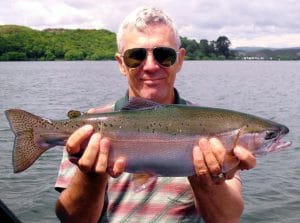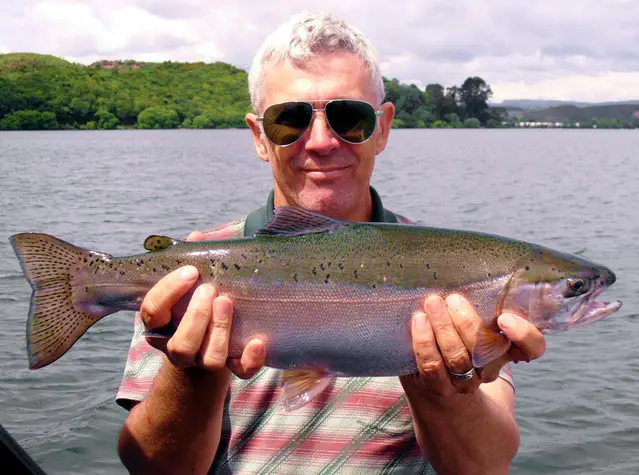
I was in high school when our parents decided we were old enough to make the yearly one or two week fishing trips to an isolated Canadian lake, Lac De Millie Lacs. While there are plenty of memories and fishing stories of big aggressive pike and feeding walleye, and once even caught a 4 lb smallmouth bass, we also heard there were giant lake trout, as well, but we never saw them. In camp it didn’t take long for me to figure out that everyone had a different opinion on lake trout, and no one knew who was right.
One theory that I still see to this day is that lake trout mostly feed at night. But is this true? While talking to various guides and some of my northern angler friends, the consensus seems to be that this rumor is mostly false.
So since there’s nothing special about night feeding and lake trout, what do anglers need to know to give themselves the most success if you’re an angler who doesn’t believe darkness is any reason to stop the fishing?
Table of Contents
How to Find Lake Trout at Night
There’s a rumor that lake trout can really go into a feeding frenzy under a full moon. Then again, that rumor exists for almost every type of sports fish species out there.
While there are certainly going to be anglers who have had this experience, and even more who swear by it, the general consensus I’ve found talking to several guides and wildlife rangers are that there isn’t really any evidence to this being true.
There might be situations where it’s true but keep in mind many of the far north places where lake trout really thrive are also places that receive enormous amounts of sunlight (like 24 hours a day, which I can attest to from my Alaska days).
How easily you can find lake trout at night depends a lot on how much homework you did during the day!
- Did you look at where the rivers and tributaries feed out to the standing bodies of water?
- Did you plot out where the current goes and where it dissipates?
- Do you know where the eddies are and can you locate them at night?
- Did you watch for which areas received too much boat traffic?
All of these are factors which can still affect where lake trout prefer to congregate especially at night. Then there’s also whether you are fishing an area with active rivers and tributaries that heavily feed the local ecosystem or if you’re fishing a truly gigantic lake with some incredible deep spots filled with the bait fish lake trout love at a depth that requires little movement on their part.
Now all this being said, to roll back to the original post point: Unless there are special local circumstances or a situation that would cause unusual activity at night, there is nothing that causes lake trout to feed more at night versus the day – and there are plenty of anglers and guides who believe they actually tend to feed less at night in most instances!
Common Lake Trout Feeding Habits
The best way to fish for lake trout whether day or night is to study the feeding habits of the bait fish they feed on in the area. Different habitats have different common bait and what those food sources do can change just exactly where lake trout are located, what they are likely to bite on, and even when they are likely to feed.
Lake trout feed on a wide variety of different food sources, and because of that what works stunningly well in one lake might not work as well in a northern river.
Just a small list of things lake trout eat include:
- Alewives
- Zooplankton
- Insects
- Insect larvae
- Snails
- Leeches
- Crustaceans
- Grayling
- Suckers
- Local baitfish
- Other small lake trout
Find out what lake trout like locally. By knowing the habits of the food source you’ll be able to narrow down where lake trout are likely to be at any time of the day or night since they will follow their favorite food sources.
Some Common Lake Trout Feeding Times
Going once again with the caveat of each place having its own habits, there are still some general rules of thumb when it comes to feeding. Above all else finding the holes and depths where the lake trout are at is crucial to success, but when you find them the best feeding times in many places tend to be:
- Early morning in the pre-dawn, dawn, and barely post-dawn light
- 10-11:30 a.m. in many northern lakes this is a time of warming up where lake trout just begin to move and feed
In many locations there might be a time specific “feeding time” as well, and these can shift a bit based on season and if there are some extended unusual weather conditions.
How to Fish Lake Trout at Night
Glowing lures/bait are one of the biggest pieces of advice for lake trout fishing, especially when fishing for them at night. Fish don’t have the eyes of an eagle, and they need to be able to see a potential food source to strike at it. While lake trout are almost never found in brackish water, they are found very deep which means glow matters a lot.
In fact many avid lake trout anglers recommend attaching a piece of bait the size of a thumbnail on the hook and have a glowing lure that you use even during the day time.
If you are going to fish for lake trout at night then you will want to do your scouting during the day. See where the baitfish goes, where the currents from rivers, channels, and creeks meet with a deep lake, and figure out where the the favorite holes are.
Chances are the lake trout at night are going to be in similar places to where they are during the day and understanding local currents, deep fishing holes, and those types of factors will set you up for success at night.
Have the Right Equipment
Aside from glowing lures, you want to make sure to be prepared for night fishing. That includes the proper lighting, safety gear, and a setup that allows for safe night fishing and an ability to make your way through the darkness.
Night fishing is an incredible experience and if that’s the only time you have for going after some serious trophy-sized lake trout then you’re in for a treat, but you need to have the right equipment for both safety and success.
One pro tip: Look at red lens flashlights or head lamps. This allows you to see clearly without ruining your night vision or blinding your boatmate while they’re trying to net your lake trout.
For Further Reading
- Lake Trout on Wikipedia
- Best Trout Fishing Nets Reviewed
- Great YouTube video catching 50 lb lake trout
- What is the right fly rod weight for trout?
- What is a panfish?
Fun Fact: Lake trout actually aren’t trout but char. All part of the same general family that includes salmon, but an interesting fact to note.

